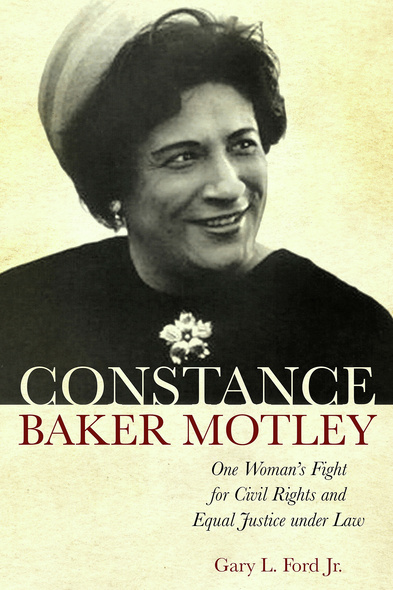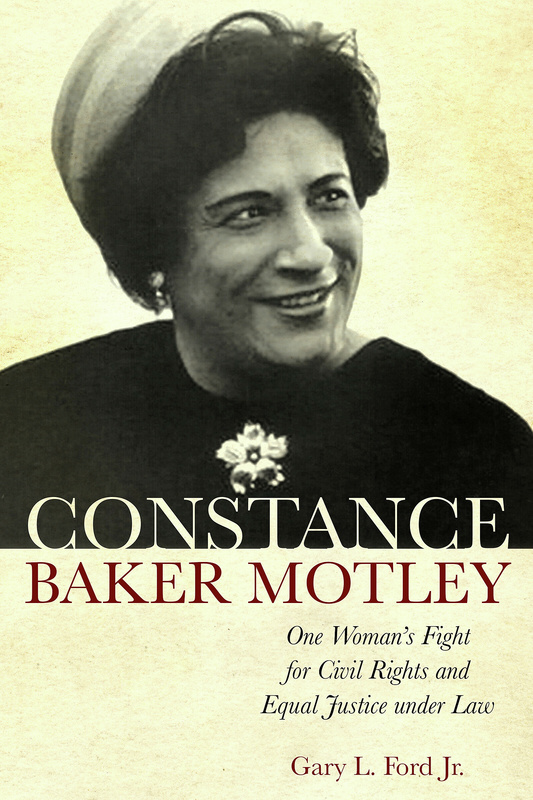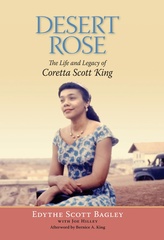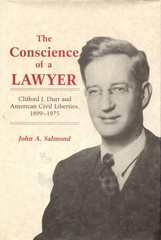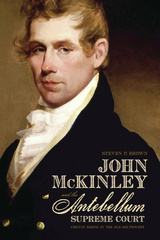Constance Baker Motley
One Woman's Fight for Civil Rights and Equal Justice under Law
By Gary L. Ford
University of Alabama Press
When the name Constance Baker Motley is mentioned, more often than not, the response is “Who was she?” or “What did she do?” The answer is multifaceted, complex, and inspiring.
Constance Baker Motley was an African American woman; the daughter of immigrants from Nevis, British West Indies; a wife; and a mother who became a pioneer and trailblazer in the legal profession. She broke down barriers, overcame gender constraints, and operated outside the boundaries placed on black women by society and the civil rights movement. In Constance Baker Motley: One Woman’s Fight for Civil Rights and Equal Justice under Law, Gary L. Ford Jr. explores the key role Motley played in the legal fight to desegregate public schools as well as colleges, universities, housing, transportation, lunch counters, museums, libraries, parks, and other public accommodations.
The only female attorney at the NAACP Legal Defense and Educational Fund, Inc., Motley was also the only woman who argued desegregation cases in court during much of the civil rights movement. From 1946 through 1964, she was a key litigator and legal strategist for landmark civil rights cases including the Montgomery Bus Boycott and represented Martin Luther King Jr. as well as other protesters arrested and jailed as a result of their participation in sit-ins, marches, and freedom rides.
Motley was a leader who exhibited a leadership style that reflected her personality traits, skills, and strengths. She was a visionary who formed alliances and inspired local counsel to work with her to achieve the goals of the civil rights movement. As a leader and agent of change, she was committed to the cause of justice and she performed important work in the trenches in the South and behind the scene in courts that helped make the civil rights movement successful.
Constance Baker Motley was an African American woman; the daughter of immigrants from Nevis, British West Indies; a wife; and a mother who became a pioneer and trailblazer in the legal profession. She broke down barriers, overcame gender constraints, and operated outside the boundaries placed on black women by society and the civil rights movement. In Constance Baker Motley: One Woman’s Fight for Civil Rights and Equal Justice under Law, Gary L. Ford Jr. explores the key role Motley played in the legal fight to desegregate public schools as well as colleges, universities, housing, transportation, lunch counters, museums, libraries, parks, and other public accommodations.
The only female attorney at the NAACP Legal Defense and Educational Fund, Inc., Motley was also the only woman who argued desegregation cases in court during much of the civil rights movement. From 1946 through 1964, she was a key litigator and legal strategist for landmark civil rights cases including the Montgomery Bus Boycott and represented Martin Luther King Jr. as well as other protesters arrested and jailed as a result of their participation in sit-ins, marches, and freedom rides.
Motley was a leader who exhibited a leadership style that reflected her personality traits, skills, and strengths. She was a visionary who formed alliances and inspired local counsel to work with her to achieve the goals of the civil rights movement. As a leader and agent of change, she was committed to the cause of justice and she performed important work in the trenches in the South and behind the scene in courts that helped make the civil rights movement successful.
The story of Motley's life and legal victories is an example of the vital, often overlooked role that women—and trial attorneys—have played in changing American society for the better.'
—Trial magazine
'Ford's book is more than a general biography of the woman who would become the first African-American female United States district judge; it presents in vivid detail how her work altered the legal landscape of the United States systematically, case after case, dismantling the Jim Crow laws in the Southern United States.'
—US District Judge Marcia Cooke, Law360
'Part history, part law, and part homage, this work provides the background to the extraordinary life of Constance Baker Motley. Ford (Lehman College) aims to couch Motley’s incredible accomplishments within social and political times. Contextualizing Motley’s work at the NAACP Legal Defense and Educational Fund helps the reader see how her legal mind shaped the Civil Rights Movement. Ford’s book consists of seven chapters, all of which seek to provide a context for Motley and her fight for justice. Providing a historical foundation to race relations in the US and subsequently to Motley’s work, Ford details how the Civil Rights Movement was shaped by Motley’s litigation. Moving through the integral cases, Ford leads the reader to better understand how and why desegregation was the best option from both a legal and cultural perspective. The book provides insight into Motley's life and highlights her work as an activist lawyer. Constance Baker Motley is an important book in the field, best suited for anyone generally interested in issues related to desegregation in the US in the 20th century. Highly recommended.'
—CHOICE
Gary L. Ford Jr.’s well-researched book is more than a biography of Motley’s extraordinary life. It is an argument for recognizing the tenacious, courageous role African American women like her played in advancing the cause of civil rights and equal justice for all. To witness Judge Motley in action was to be fortified and astounded. Now, thanks to Ford, a new generation can bear witness to her immense talents.’
—Henry Louis Gates Jr., Alphonse Fletcher University Professor, Harvard University
‘I had no idea how critical Constance Baker Motley’s role was until I read this book. Its insights about the way in which she, more than the males at the Legal Defense Fund, would get on a plane and head south time and again, into dangerous situations, defying racial and gender conventions, defying governors, legislatures, judges, and white mobs, persisting through every obfuscation, to make the Brown edict real, were a revelation!’
—Sheryll Cashin, professor of law at Georgetown University and author of Loving: Interracial Intimacy in America and the Threat to White Supremacy
Gary L. Ford Jr. is an assistant professor of Africana Studies at Lehman College. He has earned several degrees, including a BA in African American History from Harvard University, a JD from Columbia University, an MFA in Creative Writing from the New School, and a PhD in American Studies from the University of Maryland.
Acknowledgments
1. Clarifying and Correcting the Narratives of the Civil Rights Movement
2. Black Women: On the Front Lines but Not Properly Credited
3. Early Life and Preparation to Become a Leader
4. Work in the Trenches: The Case-by-Case Implementation of Brown v. Board of Education
5. Representing Protesters: Mass Demonstrations, Marches, Sit-Ins, and Freedom Rides
6. Desegregating America, Case by Case, in the Supreme Court
7. The Transition from Activist Movement Lawyer
Conclusion
Appendix: Constance Baker Motley’s NAACP Legal Defense and Educational Fund Cases
Notes
Bibliography
Index

